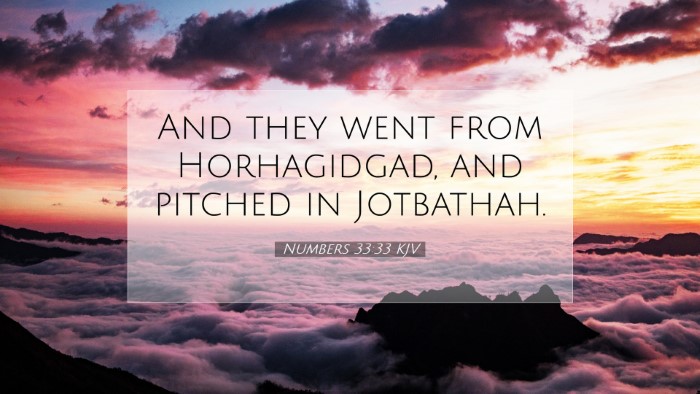Commentary on Numbers 33:33
Verse Text: "And they departed from Abronah, and pitched in Ezion-gaber."
Introduction
The book of Numbers presents a detailed account of the Israelites' journey through the wilderness toward the Promised Land. Chapter 33 serves as a historical record of their encampments, signifying God's guidance and the fulfillment of His promises. In this specific verse, the mention of Ethereum indicates the transition of the Israelites from one phase of their journey to another, embodying the perpetual movement toward God's promises. This commentary analysis is drawn from esteemed public domain sources such as Matthew Henry, Albert Barnes, and Adam Clarke.
Contextual Significance
Before delving into commentary specifics, we must recognize the broader context: Numbers 33 contains an itinerary of the wilderness wanderings, emphasizing God’s faithfulness through each stage of the journey. Throughout these travels, names of places hold essential meanings and reflect both geographical and spiritual truths.
Historical Insights
Matthew Henry: In his observations, Henry draws attention to the significance of the locations mentioned in the itinerary. Each encampment teaches lessons about reliance on God and reflects His providential care. The departure from Abronah and the setting up at Ezion-gaber symbolizes a continual journey in faith, emphasizing the transient nature of earthly life as believers anticipate their eternal home.
Spiritual Lessons
Albert Barnes: Barnes explicates the significance of Ezion-gaber, interpreting it as a place near the Red Sea, indicating that it was vital for the Israelites as they prepared for their future engagements. His commentary hints at the notion that movement in faith requires readiness and a willingness to follow God’s direction, even in uncertainties.
Adam Clarke: Clarke elaborates on the geographical aspects of Ezion-gaber and its proximity to crucial locations within the Israelite narrative. He reflects on the security and abundance of the area, drawing parallels to our spiritual journey. Just as the Israelites found sustenance and safety, believers today are reminded that God provides for their needs as they journey through life’s wilderness.
Significance of Locations
- Abronah: A less frequently mentioned location, its name reflects mourning (from the Hebrew root ‘abron’), signifying the struggles and trials the Israelites faced in their journey.
- Ezion-gaber: Known for its access to the sea, this location symbolizes a new season of opportunity and the potential for new beginnings. For pastoral teachers, this can represent an entering of new territory in faith experiences.
Theological Reflections
This transition marks more than a mere geographic shift; it is a theological statement of a community in flux – from a place of lament to a place of promise. The narrative may inspire modern believers to acknowledge their journey and the faithfulness of God amidst trials.
Divine Guidance
The Israelites' journey shows us the necessity of divine guidance in our lives. Each stage is marked by God's leading, a truth echoed in contemporary Christian life as believers seek His will. Matthew Henry articulates this necessity further, presenting the episode as a reminder that God is at the helm of our conduits.
Lessons on Movement and Transition
As the Israelites move from one place to another, they carry with them the faith that sustains them. Barns emphasizes the importance of being active in faith, not remaining stationary. This dynamic faith life is vital for pastors to convey, encouraging congregations to embrace change as part of spiritual growth.
Concluding Thoughts
As we reflect on Numbers 33:33, it serves as a profound reminder of the ongoing journey of faith. The encampments signify not just physical moves but represent transitions in spiritual maturity and dependence on God. We are called to move from a place of uncertainty (Abronah) to a place of promise (Ezion-gaber), constantly seeking God's presence along the way.
Final Application
For pastors, students, theologians, and Bible scholars, this verse encapsulates much about dependence on God, the importance of remembering history, and the need for constant movement in faith. Through this understanding, communities can be better equipped to navigate their journeys with the security that comes from knowing they are not alone. They have a God that leads, provides, and promises sustenance to all who trust in Him.


